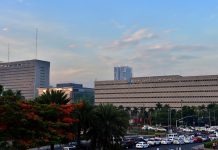by Lovely A. Carillo
The Trade Union Congress of the Philippines (TUCP) is adamant about its petition to increase minimum wage in the Davao region, which includes the provinces of Davao Oriental, Davao del Norte, Davao del Sur and Compostela Valley, as well as the cities of Tagum, Panabo, Island Garden City of Samal and Digos.
TUCP regionalized its petition for wage increase last Tuesday by demanding a P75 across the board wage increase for the Davao region. The labor group also filed a similar petition in Metro Manila last Monday, and are set to file wage hike petitions in Cebu and Cagayan de Oro City soon.
“The correct level of minimum wage for Region 11 should be P340 per day,” TUCP Party List representative Raymond Mendoza said.
Region 11 has an existing minimum wage rate of P265, a result of the last wage hike granted to the region’s labor force two years ago in May 2008. Included in their petition is the integration of the COLA (Cost of Living Allowance) into the basic wage.
“This is non-negotiable considering that it has been two years since the last wage hike,” TUCP secretary general Alex Aguilar said. While they will accept the non wage benefits from management like meal or transportation allowance, he added, this should not be a replacement of the proposed wage increase.
If the Regional Tripartite Wage and Productivity Board 11 fails to grant the petition, the group will be forced to file a motion for consideration with the National Wages and Productivity Board. And if this fails, Aguilar said they will then be forced to push for a legislated wage increase but are faced with the problem of the Congress being in recess.
“Hopefully the wage increase we are asking for will be approved on or before Labor Day on may 1, 2010,” he said.
The P75 minimum wage increase includes the P26.50 actual price increase from June 2008 to January 2010, as well as the P23.50 rise in Consumer Price Index from January to December 2010.
“It also incorporates the amount of P25 to represent the 21 years that there have been no increases in real wage since 1989,” Mendoza said. TUCP calls this “equity supplement” to workers who have created new wealth but have not shared in the benefits.
Mendoza said TUCP has refrained from petitioning for wage increases for almost two years due to the global financial crisis. However, he said, the world and the country have recovered from the crisis and it is but right that the workers catch the wave of recovery, he added.
“The Davao region is among the country’s fastest growing regions but we are only asking a mere P1.20 per day share from the country’s economic growth,” he said. Mendoza cited the constant increases in the gross regional domestic product, averaging a 5.1% yearly growth from P49,970 million in 1989 to P63,987 million in 2008.
He also reiterated that the minimum wage increase should be granted not only by minimum wage earners, but also by those who are earning more than the minimum wage earners. Both types of wage earners are already equally disadvantaged by the price-wage developments, he added.
Aguilar said a more drastic mass action will always be available as an option for the TUCP. He said it is an ultimate bargaining tool which they will not hesitate to use when necessary. However, he added, for as long as there are legal and more diplomatic ways of doing things then we will opt for that.
He said there is a need to review or even remove the RTWPBs but as of the moment, this is the mechanism provided by law which allow workers to seek wage hike.
“The advocacy of TUCP is to take away the voting rights of the Department of Trade and Industry as well as the National Economic and Development Authority,” he said. It is best that these agencies serve the wage boards only as resource persons without voting rights, he added.






